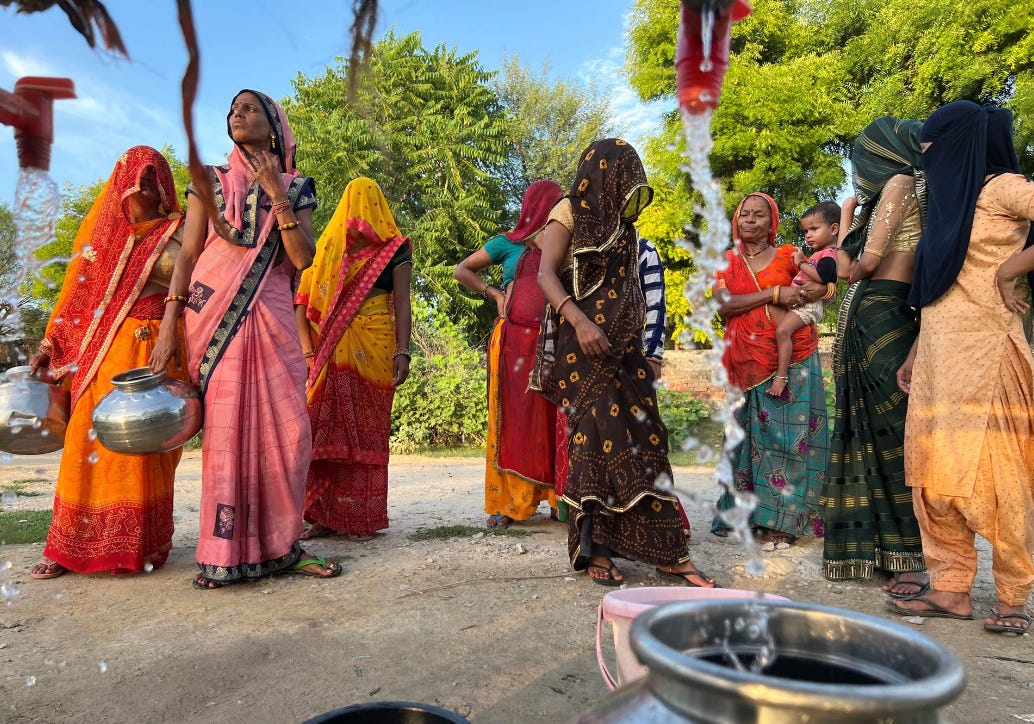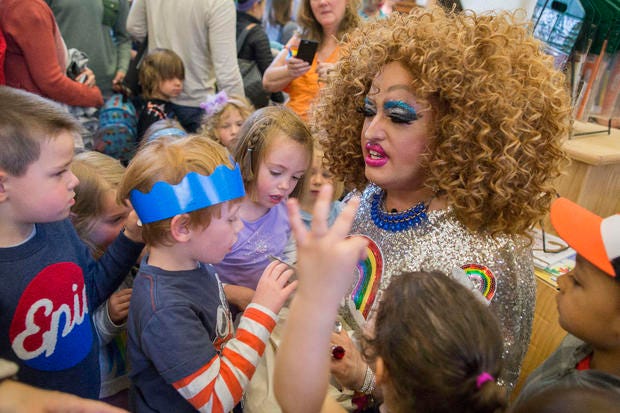Global Roundup: Poland Pride Marches, Iran LGBT Activists, India Women in Villages vs Access to Water, Scottish Sex Workers Cost of Living, Drag Queen Story Hour,
Curated by FG contributor Samiha Hossain
The Pride March in the city of Katowice, Poland. (Twitter/ milosc_) via Pink News
The Pride event in the city of Katowice, Poland, took place for the sixth year on Saturday and drew around 4,000 participants. The march, held jointly with the Ukrainian city of Odessa in solidarity, was threatened with anti-LGBTQ+ protests by the anti-LGBTQ+, anti-abortion group Fundacja Pro. The mayor of Katowice initially banned the group from attending the Pride march to protect “safety and public order.” Although the mayor’s directive was overturned by a court, just a few members of Fundacja Pro turned up at the event, and it went ahead peacefully, despite the group’s banners equating the LGBTQ+ community with pedophilia. In a similar turn of events, a Pride march in the city of Lublin went ahead without violence, despite having been repeatedly targeted over the last few years.
[The march was] an opportunity for the community to feel safe and comfortable [and to remind] our city, the region, and all of Poland that we are here, that we will not disappear because someone has a problem accepting that the world is not black and white. - Przemysław Walas, Katowice Pride organiser
Over the last few years, counter-protesters have hurled lit flares into the march, and violence has erupted as far-right protesters hurled eggs and bottles into the crowd, while in 2019, a couple was arrested for bringing explosives to the march. But on Saturday, around 1,000 people attended the event, and although there was a heavy police presence, violence was avoided.
One participant said that the increasing anti-LGBTQ+ hostility from Poland’s government has, in fact, backfired. By bringing attention to the queer community, politicians have helped Polish people “find out that this is not some imaginary gay who spreads diseases, but actually the person who we buy bread from in the morning, our neighbour, or our colleague at work.”
Zahra Seddiqi Hamedani was reportedly arrested in October 2021 while attempting to cross into Turkey to seek asylum, TWITTER/1500TASVIR via BBC
Two LGBT activists have been sentenced to death in Iran, a rights group says. The Hengaw Organization for Human Rights reported that a court in Urmia had found Zahra Seddiqi Hamedani, 31, and Elham Choubdar, 24, guilty of "spreading corruption on Earth". It said prosecutors had accused them of promoting homosexuality, promoting Christianity and communicating with media opposed to the Islamic Republic.
There was no immediate confirmation from the judiciary, but many Iranians took to social media to demand that the death sentences be revoked.
Hengaw said Seddiqi Hamedani, also known as Sareh, was from the predominantly Kurdish town of Naqadeh in West Azerbaijan province, which borders both Turkey and Iraq. Amnesty International previously described Sareh as a "gender non-conforming human rights defender" who it said had been detained "solely in connection with…real or perceived sexual orientation and gender identity as well as…social media posts and statements in defence of [LGBT] rights.”
Amnesty said the accusations of "spreading corruption on Earth" through promoting homosexuality and communicating with hostile media stemmed from Seddiqi Hamedani's public defence of LGBT rights and Sareh’s appearance in a May 2021 BBC documentary about abuses that LGBT people were suffering in Iraq's semi-autonomous Kurdistan Region, where Sareh had been living. The accusation of promoting Christianity was for wearing a cross necklace and attending a house church in Iran several years ago, Amnesty added.
Before attempting to leave Iran, Seddiqi Hamedani recorded a video in which Sareh said:
I want you to know how much pressure we LGBT people endure. We risk our lives for our emotions, but we will find our true selves... I hope the day will come when we can all live in freedom in our country. I am journeying toward freedom now... If I don't make it, I will have given my life for this cause. - Seddiqi Hamedani
Hengaw provided no details about Elham Choubdar other than saying that she was from Urmia.
Women collect water from a public water tank in Karansar village in the Indian desert state of Rajasthan, India, August 26, 2022. REUTERS/Sunil Kataria
Tired of having to spend hours fetching water and desperate for a piped water connection to their rural homes, a band of more than 10 other women in the arid northern Indian state of Rajasthan began a crusade in 2018. At one point they even locked up one of the village leaders in his home until he agreed to speak to authorities about their demands.
In August 2019 Prime Minister Narendra Modi announced a plan to connect all rural households with piped water by 2024, a major objective of his second term in office. Under the Jal Jeevan Mission, as it is known, and in partnership with UNICEF, the women finally had taps in their homes in 2020, and are among the many households being covered as the government races to meet its deadline.
About 200,000 Indians die every year due to inadequate access to safe water, the National Institute for Transforming India (NITI) Aayog, a government think tank, said in a report in 2018.
The men usually get ready and leave for their jobs and the major water-related problems are faced by women. - Suraj Prajapati, 36, mother of two
Before the taps were fitted in their homes, the women often compromised on their own health, skipping baths on alternate days and walking in the searing heat to fetch water for their households.
So, all the women in the village came together and told the village council about the challenges we were facing and only then were our problems resolved. - Suraj Prajapati
Three of the country's 28 states have already connected all households with tap water, and another 15 have achieved more than half of their target. Rajasthan, however, is a laggard, with only a quarter of its 10 million rural households connected, according to federal government data. The neighbouring village of Karansar is one of many villages that has yet to get piped water and where women and young girls still spend hours carrying pots.
ScotPep is a sex-worker led charity aiming to promote the equality and safety of all people who sell sex in Scotland. The charity was started in 1989 and since then has been campaigning to improve the rights and treatment of sex workers in Scotland. Their campaigns manifest in many different ways, from speaking in parliament to engaging with sex workers around Scotland and doing their best to foster and engage with the Scottish sex work community.
From speaking with other sex workers, sex work has not bounced back from the pandemic like many other industries have - while there’s certainly more work than there was in lockdown, it feels like we’ve left out to dry by the government. - Jordan Phillips, a ScotPep board member and PHD researcher at the University of Stirling
Phillips say that the cost of living crisis has massively impacted sex workers, who are already marginalized. He says it has affected their safety and agency in particular.
Suddenly if you have a client offering twice as much money to have unprotected sex, your ability to refuse is impacted by the precarious labour market, meaning you might not be able to make that money anywhere else. - Jordan Phillips
The government is currently trying to shut down all the websites sex workers use to advertise their services, which Phillips says will push sex workers onto the streets, where they are more vulnerable to violence.
ScotPep is calling for a few things to protect sex workers in the new Scottish model, including the decriminalisation of soliciting, secure housing for all, the decriminalisation of drugs, working with sex workers on legislation, and an end to the hostile environment against sex workers from public institutions like the police.
In this Saturday, May 13, 2017 photo, Lil Miss Hot Mess reads to children during the Feminist Press' presentation of Drag Queen Story Hour! at the Park Slope Branch of the Brooklyn Public Library, in New York, MARY ALTAFFER/AP via CBS
Drag queen performers read children's books to young audiences and their families. The books that are read sometimes also feature LGBTQ+ characters. The events - usually hosted at public libraries and bookshops - are typically aimed at children aged between three and 11.
The first event was founded in San Francisco by LGBTQ+ author and activist Michelle Tea in 2015. Tea has said she came up with the concept as a child-friendly way to introduce her young son to LGBTQ+ culture. The events have since spread across the United States and to countries including Britain, Sweden, Canada, Japan, and Australia. Each local or national chapter is individually managed and funded.
Children love larger than life, magical characters, and drag queens have the biggest hearts and most creative mind. - Michelle Tea
Drag storytimes have drawn protests, while several Republican politicians in the United States have pledged to take action to prevent them altogether. Critics say that drag acts are inherently sexual, and that nursery and primary school-aged children are too young to be introduced to LGBTQ+ topics. Some of the protests have been linked with far-right political groups, such as the Proud Boys, and Gays Against Groomers.
Supporters say the shows are age-appropriate and that critics are motivated by homophobia, drawing on long-standing prejudices that equate being gay with pedophilia.
Drag Queen Story Hour UK wants to show the world that being different is not a bad thing. By providing imaginative role models for children to look up to, we can change the world book by book. - Spokesperson for the group
Drag story hour organisers and performers have said they will not be deterred by the criticism.
It does upset me to see that these people still exist ... but what I would say is that these people are also the drive behind what I do. -Sab Samuel, who founded Drag Queen Story Hour UK
Samiha Hossain (she/her) is a student at the University of Ottawa. She has experience working with survivors of sexual violence in her community, as well as conducting research on gender-based violence. A lot of her time is spent learning about and critically engaging with intersectional feminism, transformative justice and disability justice.
Samiha firmly believes in the power of connecting with people and listening to their stories to create solidarity and heal as a community. She refuses to let anyone thwart her imagination when it comes to envisioning a radically different future full of care webs, nurturance and collective liberation.







The level of ignorance one has to embrace in order to equate being LGBTQ+ with pedophilia is astounding. But that's the same level of ignorance it takes to believe in a magic sky daddy who wants us to murder humans for "spreading corruption on earth." I hope we evolve into a wiser species before our own foolishness wipes us out.